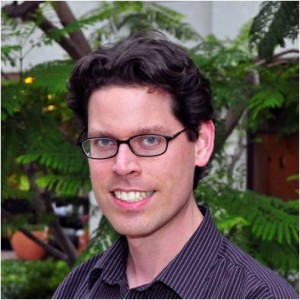Dr. MacKay received his S.B. in chemical engineering and biology from the Massachusetts Institute of Technology in 1999. A Howard Hughes Medical Institute Predoctoral Fellow, he completed his Ph.D. at the University of California at San Francisco and Berkeley in the joint graduate group in Bioengineering in 2005. As a Kirschstein National Research Service Award Postdoctoral Fellow, Dr. Mackay studied at Duke University in the Department of Biomedical Engineering. In 2008 Dr. MacKay joined the faculty at the University of Southern California in the Departments of Pharmacology and Pharmaceutical Sciences and Biomedical Engineering. His group explores biomolecular engineering and nanomedicine.
Dr. MacKay’s lab is engineering a new generation of drug carriers that change physical properties in response to diseased microenvironments. Cancer is his primary focus, with special consideration given to diseases of the central nervous system. The delivery of drugs, both in the brain and throughout the body, is hindered by access to the tumor site. To address unmet needs in brain delivery, there is significant clinical interest in direct infusion into the brain and trans-endothelial transport. His group explores both of these avenues for circumventing the blood-brain barrier, employing bioresponsive peptides and liposomes to expand treatment options. Their approach is to repackage drugs into bioresponsive nanocarriers (10-200 nm in diameter), composed from lipids and/or peptides, which activate tumor-specific drug release and reduce toxicity. Successful carrier strategies are being formulated and evaluated for translation to the clinic.
Research interests: Liposome, Micelle, Dendrimer, Polymer, Biomolecular Engineering, Elastin-like polypeptide, Chemotherapy, Doxorubicin, Nanoparticle, Nanomedicine, Nonviral Gene Therapy, pH-responsive, Temperature-sensitive, Hyperthermia, Tumor targeting, Ocular, Drug delivery, Cancer, Eye, Glioma, Brain tumor, Theranostic.
What was your inspiration in becoming a chemist?
I am not a traditional chemist, but have been an engineer since I was in elementary school. I studied Chemical Engineering and Biology as an undergraduate and became fascinated by the possibility of redesigning biological systems and therapeutics that operate in biological systems. When I first started to learn about molecular biology, I became obsessed with the idea of making entirely synthetic genes and seeing what cells would do with them. During my training, this developed into my current research focus on the use of protein polymers to modulate specialized biological molecules.
What was the motivation to write your Polymer Chemistry article (DOI:10.1039/C3PY00537B <http://dx.doi.org/10.1039/C3PY00537B>)?
Polymer Chemistry has an excellent reputation, and I want to let the world of synthetic chemists know more about what we can do with biologically synthesized protein polymers. The polymers we make are large polypeptides produced from synthetic genes. Our paper discusses how we can engineer their assembly into nanoparticles of different size and any given temperature and concentration. The field of protein polymers is rapidly expanding, and utilizes many of the same characterization tools used for synthetic polymers. As biomaterials, protein polymers are especially interesting due to their natural proteolytic mechanism for biodegradation and also their ability to be seamlessly fused to therapeutic peptides. What is truly interesting to me is that using genetic engineering, we can make macromolecules and nanoparticles of unparalleled complexity with reasonably good reproducibility. This has always been a key challenge for synthetic polymers. Now we are using this approach to generate novel therapeutics for cancer and ocular disease.
In which upcoming conferences may our readers meet you?
I will speak at the American Chemical Society Meeting on September 10th, 2013, Indianapolis. I will speak at the Tear Film and Ocular Society meeting on Sept 18th-19th, 2013, Taormina, Italy. I will be co-Chairing NanoDDS 2013 in San Diego, Oct 25th-27th. Students from my lab will be presenting posters at the Controlled Release Society Meeting Summer 2013, and the American Association of Pharmaceutical Scientists meeting Fall 2013.
How do you spend your spare time?
I am the proud parent of two amazing children, a 3 year old girl and a 4 month old boy.
Which profession would you choose if you were not a scientist?
I would be a musician. I play the double bass and miss my days of playing with the symphony during high school and college.
Cyrille Boyer is a guest web-writer for Polymer Chemistry. He is currently associate professor and an ARC-Future Fellow at the Australian Centre for NanoMedicine and Center for Advanced Macromolecular Design (School of Chemical Engineering, University of New South Wales (Australia)).
To keep up-to-date with all the latest research, sign-up to our RSS feed or Table of contents alert.











